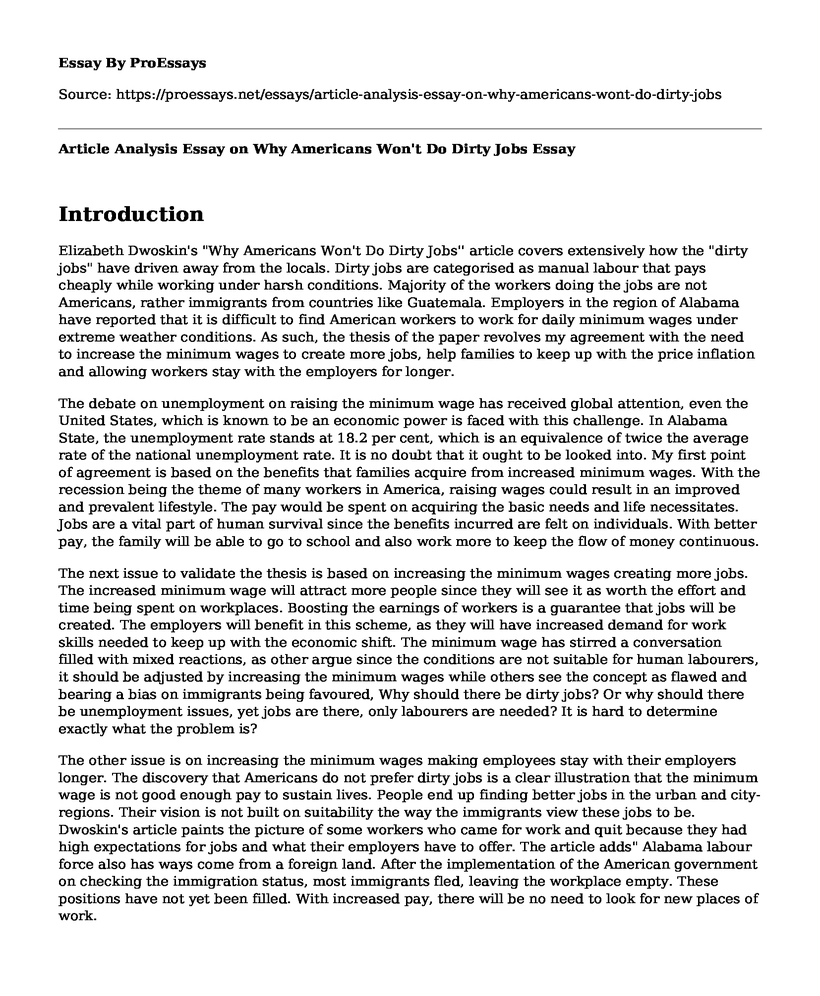Introduction
Elizabeth Dwoskin's "Why Americans Won't Do Dirty Jobs'' article covers extensively how the "dirty jobs" have driven away from the locals. Dirty jobs are categorised as manual labour that pays cheaply while working under harsh conditions. Majority of the workers doing the jobs are not Americans, rather immigrants from countries like Guatemala. Employers in the region of Alabama have reported that it is difficult to find American workers to work for daily minimum wages under extreme weather conditions. As such, the thesis of the paper revolves my agreement with the need to increase the minimum wages to create more jobs, help families to keep up with the price inflation and allowing workers stay with the employers for longer.
The debate on unemployment on raising the minimum wage has received global attention, even the United States, which is known to be an economic power is faced with this challenge. In Alabama State, the unemployment rate stands at 18.2 per cent, which is an equivalence of twice the average rate of the national unemployment rate. It is no doubt that it ought to be looked into. My first point of agreement is based on the benefits that families acquire from increased minimum wages. With the recession being the theme of many workers in America, raising wages could result in an improved and prevalent lifestyle. The pay would be spent on acquiring the basic needs and life necessitates. Jobs are a vital part of human survival since the benefits incurred are felt on individuals. With better pay, the family will be able to go to school and also work more to keep the flow of money continuous.
The next issue to validate the thesis is based on increasing the minimum wages creating more jobs. The increased minimum wage will attract more people since they will see it as worth the effort and time being spent on workplaces. Boosting the earnings of workers is a guarantee that jobs will be created. The employers will benefit in this scheme, as they will have increased demand for work skills needed to keep up with the economic shift. The minimum wage has stirred a conversation filled with mixed reactions, as other argue since the conditions are not suitable for human labourers, it should be adjusted by increasing the minimum wages while others see the concept as flawed and bearing a bias on immigrants being favoured, Why should there be dirty jobs? Or why should there be unemployment issues, yet jobs are there, only labourers are needed? It is hard to determine exactly what the problem is?
The other issue is on increasing the minimum wages making employees stay with their employers longer. The discovery that Americans do not prefer dirty jobs is a clear illustration that the minimum wage is not good enough pay to sustain lives. People end up finding better jobs in the urban and city-regions. Their vision is not built on suitability the way the immigrants view these jobs to be. Dwoskin's article paints the picture of some workers who came for work and quit because they had high expectations for jobs and what their employers have to offer. The article adds" Alabama labour force also has ways come from a foreign land. After the implementation of the American government on checking the immigration status, most immigrants fled, leaving the workplace empty. These positions have not yet been filled. With increased pay, there will be no need to look for new places of work.
Conclusion
Dwoskin's argument is that Americans are not willing to engage in a low wage and dirty jobs, because of the attitude that these types jobs are beneath them, a view that seems to impact on their lives. On the other hand, the immigrants who have dwelt on this job have travelled far for these jobs. The notion has had an impact on the country's economy. This will generate a positive impact on the GDP of the country.
"Immigrants should not be seen as people stealing jobs from Americans because that will be a distorted view of reality when in fact, it is Americans who find the very conditions migrants work in to be bad", a statement according to Alabama's employers. It is time to go back to the drawing board and find solutions to minimum wages. It is not entirely the Americans fault for turning down the jobs, because of the argument based on poor working conditions and low pay. These matters should be addressed to promote a blazing economy high on development and promoting the living standards of Americans as well as immigrants. Exploring the minimum wage discussion is beneficial for the stakeholders involved. Not only will the current economic arena change, but lives will change since the unemployment rate will reduce. The need to look for better workplaces will stop, and the living standards of people will be improved. Minimum wage increment offers the gateway out of the American recession that left people economically paralysed and usher them to an opportunity of endless possibilities.
Cite this page
Article Analysis Essay on Why Americans Won't Do Dirty Jobs. (2023, Feb 27). Retrieved from https://proessays.net/essays/article-analysis-essay-on-why-americans-wont-do-dirty-jobs
If you are the original author of this essay and no longer wish to have it published on the ProEssays website, please click below to request its removal:
- Quality Cleaning Services Company Example
- Response to OSHA Inquiry on Employees' Safety Paper Example
- How Was Training Adoption Measured in Allianz Company? Paper Example
- Outsourcing Human Resources - Essay Sample
- Essay Example on Mental Health, Workplace Safety and the ILO: Exploring a Vital Link
- Essay Example on equal Opportunities & Benefits: Techfite's Corporate Policy A & B
- Essay Sample on Automotive Cost Mitigation & Outsourcing







